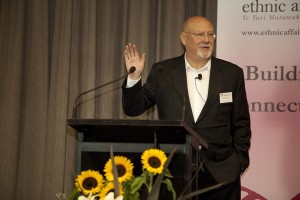Describing new migrants as those offering “possibilities of business opportunities,” a leading pharmaceutical scientist in New Zealand has suggested that employers should be given an incentive to hire new migrants.
Talking to a diverse group of 200 attendees at the EthnicA Conference in Auckland, Sir Ray Avery said, “All of you are customers of New Zealand, and we have to find out what you want.”
Urging new migrants to understand the value of Kiwi brand, Sir Ray highlighted potential business opportunities in New Zealand exports: “We produce six times cheaper than other OECD countries.”
Sir Ray wants New Zealand employers to realise the value that new migrants bring to the work force. “There are a lot of business opportunities (through new migrants). There is a huge middle class society in India and China. Opportunities come out of family and social connections.”

Migrants are a valuable source of innovation and problem solving. “They bring different ways of looking at the same problem.”
Sir Ray warned against the danger of ending up with “cultural hubs”, and suggested that “we have to make sure there is a process of integration. There needs to be some mechanism to offer opportunities for (diverse) people to meet.”
Describing New Zealand as “one of the least regulated, most open source society”, Sir Ray encouraged audience to expand their boundaries. “If you want to become the prime minister (in New Zealand), you can become the prime minister.”
After spending his childhood in English orphanages, Sir Ray went on to become an award winning scientist. He designed two Intraocular Lens Laboratories in Nepal and Eritrea that now supply 16% of the world’s market for IOLs. His innovation has reduced the cost of Intraocular lenses to $6, making cataract surgery available to the poor.
He described being New Zealander as a “state of mind, rather than ethnicity.”
Ethnic Affairs Minister Judith Collins described diversity as a “positive force, which broadens New Zealand’s horizons.” The minister arrived late for her speech, struggled to fill the speaking slot with a short speech, and left the conference soon after her presentation. It is difficult to understand why the minister would let go of the perfect opportunity to network and get a closer understanding of migrant issues by at least being present for some part of the conference organised by her own department.
As minister, Collins “will set the direction and focus for the issues that affect New Zealand’s  ethnic sector,” says the department’s briefing paper to the minister. ” This involves realising the Government’s priorities through engagement with the ethnic sector.” One could best hope that the minister will rely on its department for feedback from the conference.
In another session, Professor Richard Bedford said, “Migrants should not be thought solely as economic units, and the social welfare of newcomers also needs to be part of government policy.”
Professor Bedford is a specialist in migration studies at the University of Waikato and Pro Vice-Chancellor (Research) at the Auckland University of Technology.
In a cellphone-based poll conducted during the conference, “connecting with mainstream New Zealand” was identified as the most important issue by conference attendees, followed by “support to gain employment.â€
While the conference attracted a diverse range of policy makers, community leaders, social workers, it remains to be seen how the discussions would  be used to come up with practical solutions for migrants, if at all.
Vaibhav Gangan is the managing editor of The Global Indian magazine.

Leave a Reply